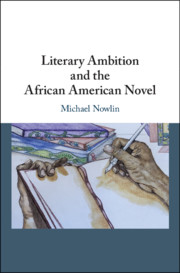Book contents
- Literary Ambition and the African American Novel
- Literary Ambition and the African American Novel
- Copyright page
- Dedication
- Contents
- Acknowledgments
- Abbreviations
- Introduction
- Chapter 1 “The First Negro Novelist”: Charles Chesnutt’s Point of View and the Emergence of African American Literature
- Chapter 2 James Weldon Johnson’s Dream of Literary Greatness and His Groundwork for an African American Literary Renaissance
- Chapter 3 The Strange Literary Career of Jean Toomer
- Chapter 4 Wallace Thurman’s Judgment and the Rush toward Modernism
- Chapter 5 Zora Neale Hurston and the Great Unwritten
- Chapter 6 Richard Wright’s Compromises: Radicalism and Celebrity as Paths to Literary Freedom
- Chapter 7 “Literary to a Fault”: The Singular Triumph of Ralph Ellison
- Conclusion
- Notes
- References
- Index
Chapter 6 - Richard Wright’s Compromises: Radicalism and Celebrity as Paths to Literary Freedom
Published online by Cambridge University Press: 17 October 2019
- Literary Ambition and the African American Novel
- Literary Ambition and the African American Novel
- Copyright page
- Dedication
- Contents
- Acknowledgments
- Abbreviations
- Introduction
- Chapter 1 “The First Negro Novelist”: Charles Chesnutt’s Point of View and the Emergence of African American Literature
- Chapter 2 James Weldon Johnson’s Dream of Literary Greatness and His Groundwork for an African American Literary Renaissance
- Chapter 3 The Strange Literary Career of Jean Toomer
- Chapter 4 Wallace Thurman’s Judgment and the Rush toward Modernism
- Chapter 5 Zora Neale Hurston and the Great Unwritten
- Chapter 6 Richard Wright’s Compromises: Radicalism and Celebrity as Paths to Literary Freedom
- Chapter 7 “Literary to a Fault”: The Singular Triumph of Ralph Ellison
- Conclusion
- Notes
- References
- Index
Summary
This chapter examines Richard Wright’s career in terms of the gap between his aspiration to emulate the great, canonized modernists like Marcel Proust and Gertrude Stein and his practical recourse to the realist and naturalist novel as still the best means of representing African American experience. It examines as well the gap between his authorial image as an uncompromising black author telling harsh truths and the unprecedented popularity of his novels thanks in good part to compromises he made with his publishers in the interest of securing publication by the Book of the Month Club. Wright’s landmark stature, this chapter demonstrates, stems in good part from his remarkable commercial success, success that ultimately made it possible for him to follow in the footsteps of his American modernist precursors and write as an expatriate in Paris. The chapter deals largely with the expressed desire of the phenomenally successful author of Native Son and Black Boy, well-tutored in what he called “the writing game” by his agent Paul Reynolds and his editor Edward Aswell, to move beyond the expectations attached to the “Negro writer” he had become. It aligns his exile with his desire to write major multi-volume works outlined in private journals and letters, as well as produce the literary equivalent of the non-figurative art whose virtues he describes at some length in the major novel of his French period, The Outsider.
- Type
- Chapter
- Information
- Literary Ambition and the African American Novel , pp. 153 - 176Publisher: Cambridge University PressPrint publication year: 2019



